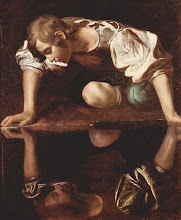 As we move on into Book IV of Ovid's "Metamorphoses", Arsippe, one of the daughters of Minyas, tells Ovid's next story, Pyramus and Thisbe, a pair of lovers in Babylon whose parents forbid their marriage. They only way they can meet is by peering and whispering through a hole in the wall between their houses. They plan to elope. Thisbe arrives first at Ninus's tomb, their rendezvous point, but is scared by a lioness. She runs away, leaving behind her veil, which the lioness plays with. Pyramus sees the lioness's tracks and the torn veil. Convinced that Thisbe has been eaten he stabs himself. Thisbe returns to find his dead body and stabs herself in turn. Their blood spurting up dyes the berries on a nearby mulberry tree red. If all this sounds familiar, there are obvious parallels with the story of Romeo and Juliet, and it is also the "lamentable comedy" performed by the mechanicals in Shakespeare's "Midsummer Night's Dream". (Sten Porse's picture of mulberry from wikicommons used under creative commons 2.5 licence)
As we move on into Book IV of Ovid's "Metamorphoses", Arsippe, one of the daughters of Minyas, tells Ovid's next story, Pyramus and Thisbe, a pair of lovers in Babylon whose parents forbid their marriage. They only way they can meet is by peering and whispering through a hole in the wall between their houses. They plan to elope. Thisbe arrives first at Ninus's tomb, their rendezvous point, but is scared by a lioness. She runs away, leaving behind her veil, which the lioness plays with. Pyramus sees the lioness's tracks and the torn veil. Convinced that Thisbe has been eaten he stabs himself. Thisbe returns to find his dead body and stabs herself in turn. Their blood spurting up dyes the berries on a nearby mulberry tree red. If all this sounds familiar, there are obvious parallels with the story of Romeo and Juliet, and it is also the "lamentable comedy" performed by the mechanicals in Shakespeare's "Midsummer Night's Dream". (Sten Porse's picture of mulberry from wikicommons used under creative commons 2.5 licence)Of the two pictures below, the first, painted in 1520, is by Niklaus Manuel Deutsch and is now in Basel's Kunstmuseum (direct linking to the picture is not possible). The second picture, by Hans Baldung was painted in 1530 and is now in Berlin's Staatliche Museen (click on the link below the picture on the museum's site for descriptive text).


Liverpool's Walker Art Gallery has a painting of Pyramus and Thisbe by Dughet from the late 1650s, slightly later than the 1651 painting by Poussin shown below, which is now in Frankfurt's Städelsches Kunstinstitut (the image on the museum's page only shows the top half of the painting, go to zoom to see the whole thing).

In the last years of the 17th century, Abraham Hondius also painted Pyramus and Thisbe and his version is now in Rotterdam's Museum Boijmans van Beuningen.
At the beginning of the 20th century John William Waterhouse painted this picture called Thisbe or The Listener, now in a private collection.

And now, from YouTube is Shakespeare's version, with the characters played by The Beatles:
(all reproductions of paintings come from wikicommons and are in the public domain)




No comments:
Post a Comment